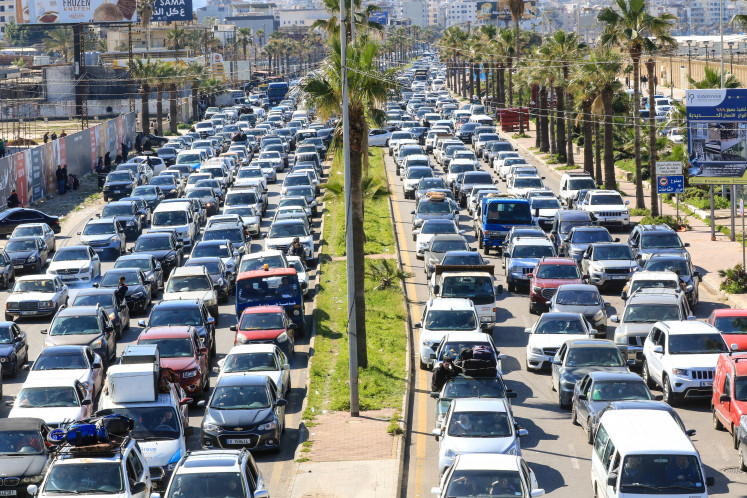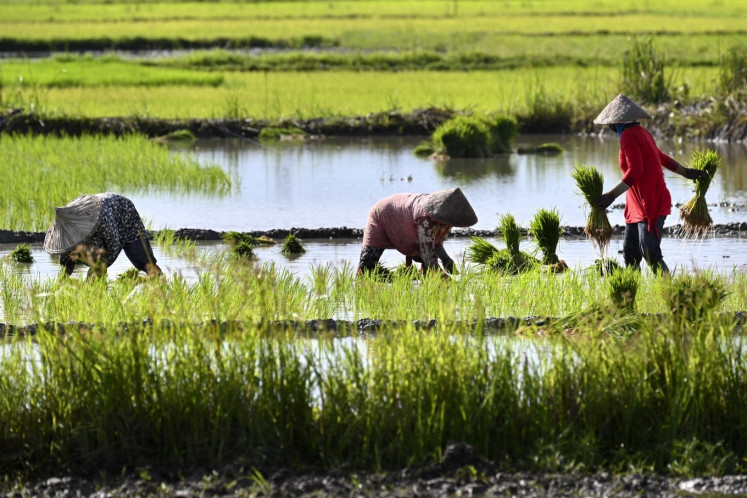Popular Reads
Top Results
Can't find what you're looking for?
View all search resultsPopular Reads
Top Results
Can't find what you're looking for?
View all search resultsThe impact of the Russia-Ukraine war on Indonesia's economy
Indonesia has become the biggest wheat importing country in the world, with 10.1 million tons since 2018 and represents 6.1 percent of the total world imports. In 2018, Indonesia imported 2.4 million tons of wheat from Ukraine, making Ukraine the biggest supplier of wheat for Indonesia, replacing Australia.
Change text size
Gift Premium Articles
to Anyone
T
he world economy had just recovered strongly in 2021 from the COVID-19 pandemic when Russia invaded Ukraine on Feb 24. But now after the Western allies have imposed sanctions against Russia, it has to face soaring oil and other commodity prices, and other economic disruption across the globe.
Higher energy prices will reduce discretionary spending by consumers leading to lower consumption. At the same time heightened geopolitical risks will intensify market volatility disrupting investment flows. The weakened growth will reverberate across the globe.
The sanctions by the Western alliance on Russia will hit Russia’s financial and energy sector hard. The removal of Russia’s major banks from the Brussels-based Society for Worldwide Interbank Financial Telecommunication (SWIFT), a secure messaging system that facilitates rapid cross-border payments, making international trade flow smoothly, will deal a big blow to Russian trade and make it harder for Russian companies to do business. The Russian central bank will not be able to use its US$600 billion reserves to defend the plunging Russian ruble.
Russia is a major oil producer at 10 million barrels of oil a day, the third-biggest producer after the United States and Saudi Arabia. It is also a key supplier of several commodities like nickel, aluminum, palladium, wheat and fertilizer. The sanctions will not only hurt the Russian economy but it will also hurt its trading partners, and ultimately the global economy.
Last year although Indonesia’s recovery was modest, it experienced an export boom from its oil, coal and palm oil. Total oil- and gas-related government revenue in 2021 increased 48 percent to Rp 151 trillion ($10.7 billion), more than enough to cover energy subsidies of Rp 140 trillion. However, as a net oil importer, the Indonesian oil and gas trade suffered a deficit of $13.3 billion in 2021, more than twice the deficit in 2020.
There are several ways the economic impact of the war in Ukraine could spill over to the Indonesian economy. Commodity and energy prices will remain high, and this is good for Indonesian exports. But a commodity boom has left the domestic supply of some commodities vulnerable. A higher price for coal has disrupted coal supplies to the state electricity company PLN, which still produces 60 percent of its electricity generation from coal.
Higher crude palm oil (CPO) prices abroad have wreaked havoc on the domestic supply and the price of cooking oil, practically forcing the government to provide subsidies to stabilize supply and prices. And lately, low-income households have suffered from a price hike for soybean-based tofu and tempeh, the most affordable staple foods. The price of soybean, the basic ingredient for tofu and tempeh and which is mostly imported, has soared to $585 per ton, an increase of 60 percent from 2020.



















